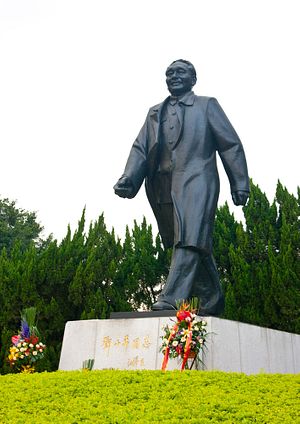This Friday, August 22, is the 110th anniversary of the birth of Deng Xiaoping, the Chinese leader who famously set China on the path of “reform and opening up” after the death of Mao Zedong. Accordingly, Deng Xiaoping has been all over Chinese media this week, including the release of a 48-episode television series focused on Deng’s role in transitioning China from the Cultural Revolution to economic prosperity. More importantly, however, Chinese media have been drawing a direct line from Deng Xiaoping to current Chinese President Xi Jinping.
A spate of Xinhua articles highlighted Xi Jinping’s speech before a symposium celebrating the anniversary of Deng’s birth. In his speech, Xi vowed to uphold what he called the most important political legacy from Deng Xiaoping: “socialism with Chinese characteristics.” According to Xi’s reading of this theory, it means that China will “reform areas that are weak and unsound and learn from good experiences of foreign countries. But we will never completely copy foreign experience let alone absorb bad things from them.” In other words, China will hold on to its own unique system (the “Chinese characteristics”) even while pursuing reform.
But despite this caveat, Xi has already made it quite clear that he wants to be remembered as a reformer rather than a caretaker of the system. For this reason, Xi seeks to paint a picture of himself as the heir to Deng Xiaoping, China’s great reformer and the man seen as directly responsible for China’s present day economic prosperity.
Xi has played into this comparison since he first came to power. Shortly after being named the general secretary of the Chinese Communist Party, Xi visited Shenzhen, the center of Deng Xiaoping’s reform efforts. Xi’s trip was an obvious echo of Deng’s own “southern tour” in 1992, when Deng visited the testing grounds for reform to demonstrate his personal support for continued changes to China’s economic system. In case anyone missed the symbolism, Xi underscored his point by laying flowers at the foot of a statue of Deng.
A Xinhua commentary on Tuesday made the Deng-Xi connection even more explicit. “To reignite a nation, Xi carries Deng’s torch,” the headline read. The article outlines the problems facing Chinese society today (including the wealth gap, the rural-urban divide, and environmental issues). To solve these problems, the article said, Xi will use the “magic tool” of reform and opening up, which was inherited “directly from Deng.” The piece argued that Xi, following in Deng’s footsteps, has embarked upon “perhaps the boldest set of economic and social reforms ever.” Under this analysis, Deng and Xi have in common a commitment to reform, the “political courage” needed to institute change, their practical approach to “grappling with thorny problems,” and (implicitly) their ability to lead China to a better future.
Xi’s embrace of Deng is in telling contrast to his handling of Mao Zedong. Last December China celebrated the 120th anniversary of Mao’s birth, providing an interesting comparison for this year’s celebration of Deng Xiaoping. As these celebrations made clear, Xi Jinping honors Mao as the founder of modern-day China — but he does not want to be seen as a Party leader in the footsteps of Mao. Even in his speech honoring Mao Zedong and his political theories, Xi made sure to point out that Mao and his compatriots were “not gods, but human beings.” Instead of modeling himself after Mao, Xi has undertaken the task of retrofitting Mao’s image to mesh with his own policy agenda, naming Mao as the source of the “Chinese Dream” and even the champion of economic reform.
In a recent article, Chinese blogger Yang Hengjun categorized China’s leaders as either “revolutionaries” (exemplified by Mao) or “reformers” (led by Deng Xiaoping). Xi Jinping has made it abundantly clear that he envisions himself as a Deng-style reformer, rather than a revolutionary leader in the Maoist tradition. It may seem like mere political posturing, but Xi’s choice of political role model has important ramifications for his future policy choices. Xi’s identification with Deng provides a clear window into Xi’s aspirations for China. In Xi’s mind, Deng was a radical reformer who was also radically successful — and that is the path Xi himself wants to follow.

































